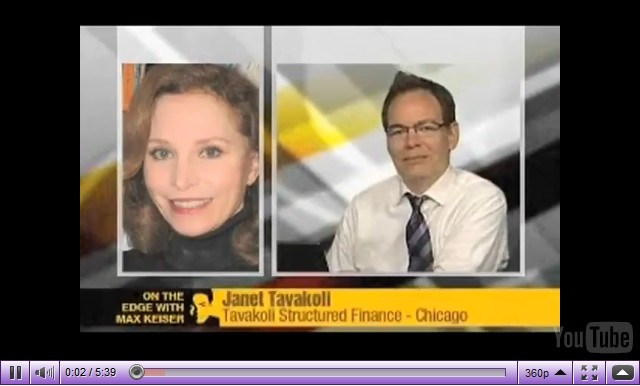Brand new op-ed from Janet, and a short bit of excellence in bank-balance-sheet truth telling with Max Keiser. No miss.
- "The government is treating us like infants."
---
The U.S. is suffering from high unemployment combined with too much consumer debt in a weak economy. Current stock market exuberance reflects earnings increases at selective companies that benefited from sputtering stimulus programs. In late 2007 through the fall of 2008, our economy had an appendix attack, and Congress issued potent addictive painkillers instead of fixing our problems.
Meanwhile, the financial system has strangled U.S. growth by parasitically growing from 3% of GDP in 1965 to 7.5% of GDP currently. As Jeremy Grantham pointed out in his quarterly letter to investors, financial services were sufficient for the economy when they were 3% of GDP, but that sector grew by strangling GDP growth elsewhere. The nation's GDP growth slowed from 3.5% in 1965 to 2.4% between 1980 and 2007, and the slowdown occurred before our current crisis.
In other words, our bloated financial sector has been sucking the life-blood out of the U.S. economy for years, and recent decisions insure it will continue to feed off taxpayers, while the host economy struggles for life.
Jobless "Recovery"
Unemployment exceeds 10%, counting the underemployed it is closer to 20%, and the figures soar beyond that when one counts our unemployed youth. The recovery is being strangled in its crib by low job creation, high consumer debt, high local government debt, high federal government debt, and falling tax revenues. [Update August 6, 2010: Official figures for overall unemployment as of July, announced August 6, held at 9.5%.]
Since the first meltdown, we've had rising--and still very high--consumer loan defaults. The Fed tried to monetize bad loans, which is just another way of saying the U.S. taxpayer is paying for bad lending decisions by Too Big To Fail financial institutions.
Nominal income is falling. Selected prices have fallen more rapidly than income, but we've had a negative wealth effect. Housing prices and investment assets fell in value. Consumer loan payments of debt-loaded consumers have to come from falling nominal income.
If we didn't have too much borrowing (leverage) in our system, the Fed's rapid pumping of money into the economy might have worked. Unfortunately, consumers and many financial institutions are still overleveraged and many of them will default or fail. This continues to be a drag on the economy and on consumer demand.
Deflation Plus "Staple" Inflation
The economic picture is distorted by both deflation and inflation. Interest rates are low for now, but consumer demand also remains too low. Banks are unwilling to lend to all but those who don't need money in the first place. The negative wealth effect of reduced home prices, a weak housing market, and reduced value of investment accounts and retirement accounts is combined "staple" inflation on items like school tuition, utilities, certain food items, and even mundane items like printer paper. Many prudent investors and consumers are unwilling to borrow, even at low interest rates.
Moreover, consumers are worried about potential local tax rises and federal tax rises, since many local government's are broke, and our national debt is $13 trillion.
If deflationary pressures combined with rising prices on many consumer items weren't bad enough, many investors are carefully watching long-term U.S. treasury interest rates in case demand for U.S. debt falls and inflation takes off.
The economy's stranguflation is the result of wealth destruction and the quadruple threat of the weak economy, high government debt load, asset deflation with price inflation of essentials, and the fear of future overall inflation.
In October 2009, I explained to Max Keiser of The Kaiser Report, why the economy would suffer an ongoing deflation crunch (instead of the stagflation I had originally expected).
--
Addendum from Janet: The bailouts were a perversion of capitalism and the principles upon which The Republic was founded. This was the result of influential interested parties reaching into the U.S. Treasury with no accountability. Capitalism doesn't call for bailouts, instead investors take losses. Shareholders in failed financial institutions should have been wiped out, debt holders would have had to accept discounts combined with debt for equity swaps, and financial institutions would have then been recapitalized without taxpayers footing the bill. Instead banks lobbied for relaxed accounting and ineffective "financial reform." No one, including bank managers, can tell how much capital is truly needed, and taxpayers' ongoing heavy subsidies give these financial institutions the appearance of stability.
---
Janet Tavakoli's book on the causes of the global financial meltdown and how to fix it is Dear Mr. Buffett: What an Investor Learns 1,269 Miles from Wall Street.
